LAW504 Commercial & Corporation Law: Agency, Authority, and Liability
VerifiedAdded on 2023/06/12
|8
|2390
|79
Homework Assignment
AI Summary
This assignment provides solutions to several problem questions related to commercial and corporation law, focusing on agency principles and corporate legal entities. The first question examines the existence of a contract under the doctrine of undisclosed principal, determining liability between Terence and Gabby. The second explores implied authority in agency law, assessing whether a contract exists between Terence and Mary through Peter's actions. The third delves into apparent authority, analyzing the validity of a contract between Gordon and Terence after Peter's termination. Lastly, the assignment addresses corporate legal entities, determining Roger's personal liability for Industrial Machines Ltd's debts and the potential for piercing the corporate veil in Explosive Industries Pty Ltd's license application. Desklib offers a wide array of study resources, including past papers and solved assignments, to support students in their academic endeavors.
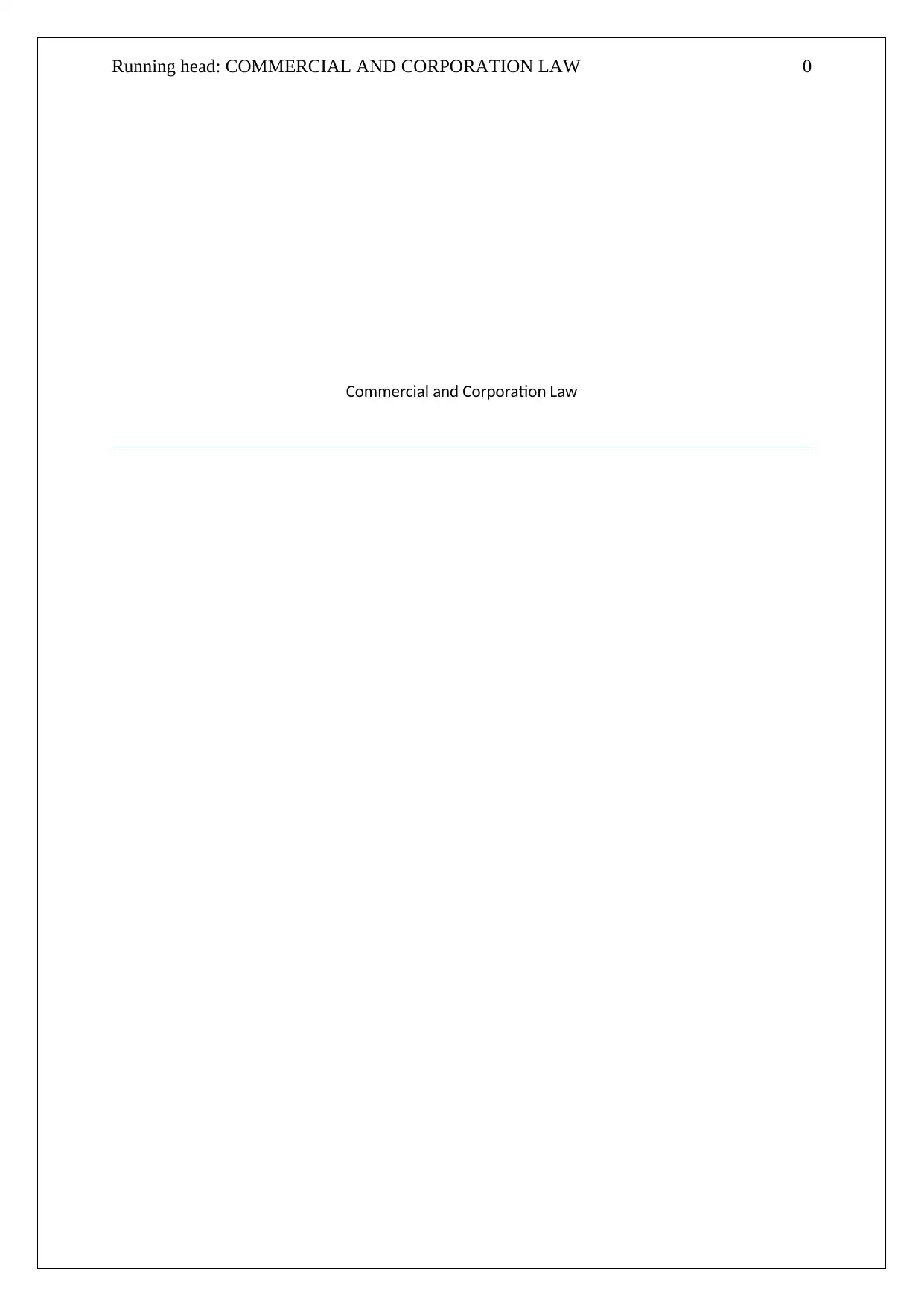
Running head: COMMERCIAL AND CORPORATION LAW 0
Commercial and Corporation Law
Commercial and Corporation Law
Paraphrase This Document
Need a fresh take? Get an instant paraphrase of this document with our AI Paraphraser
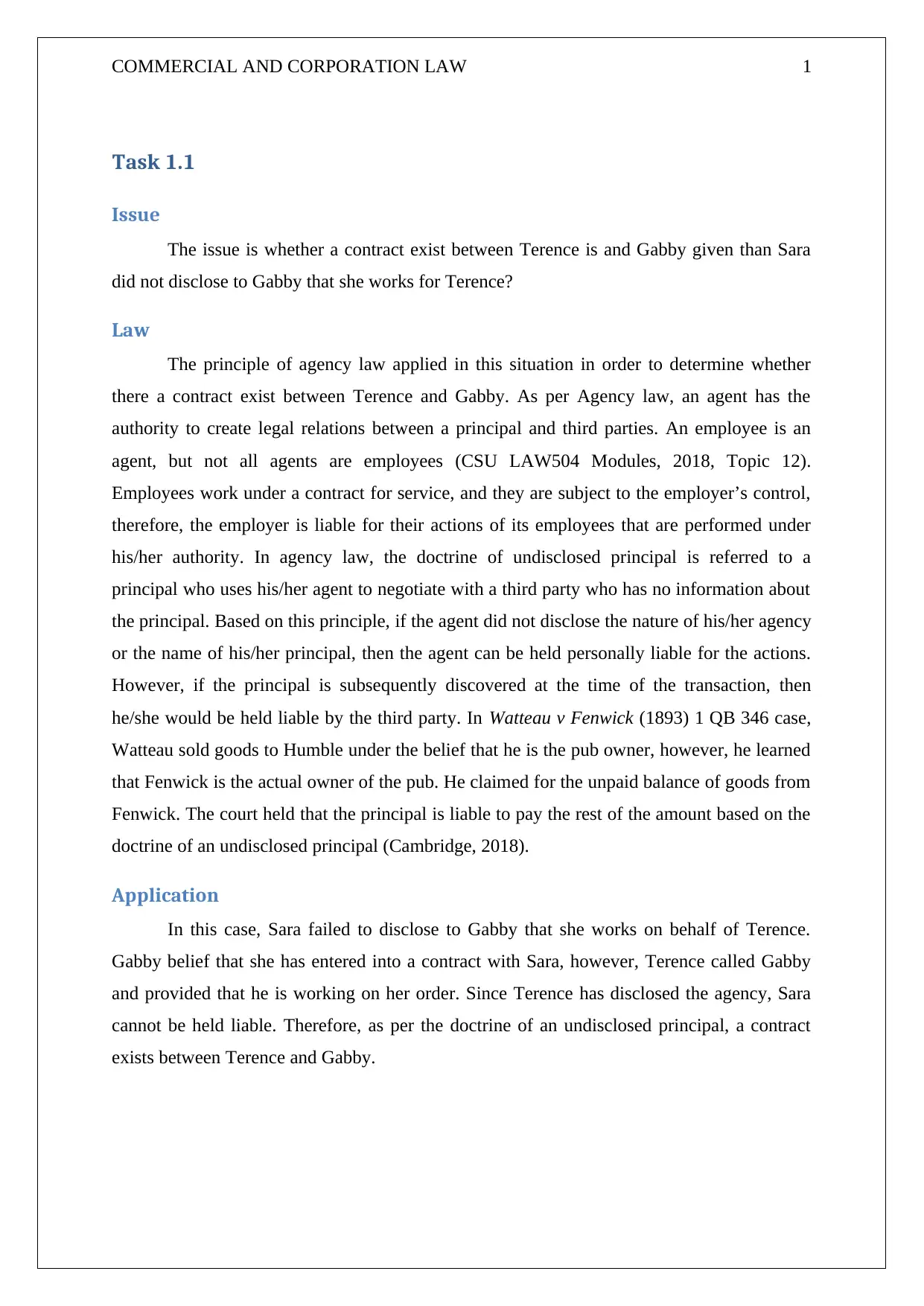
COMMERCIAL AND CORPORATION LAW 1
Task 1.1
Issue
The issue is whether a contract exist between Terence is and Gabby given than Sara
did not disclose to Gabby that she works for Terence?
Law
The principle of agency law applied in this situation in order to determine whether
there a contract exist between Terence and Gabby. As per Agency law, an agent has the
authority to create legal relations between a principal and third parties. An employee is an
agent, but not all agents are employees (CSU LAW504 Modules, 2018, Topic 12).
Employees work under a contract for service, and they are subject to the employer’s control,
therefore, the employer is liable for their actions of its employees that are performed under
his/her authority. In agency law, the doctrine of undisclosed principal is referred to a
principal who uses his/her agent to negotiate with a third party who has no information about
the principal. Based on this principle, if the agent did not disclose the nature of his/her agency
or the name of his/her principal, then the agent can be held personally liable for the actions.
However, if the principal is subsequently discovered at the time of the transaction, then
he/she would be held liable by the third party. In Watteau v Fenwick (1893) 1 QB 346 case,
Watteau sold goods to Humble under the belief that he is the pub owner, however, he learned
that Fenwick is the actual owner of the pub. He claimed for the unpaid balance of goods from
Fenwick. The court held that the principal is liable to pay the rest of the amount based on the
doctrine of an undisclosed principal (Cambridge, 2018).
Application
In this case, Sara failed to disclose to Gabby that she works on behalf of Terence.
Gabby belief that she has entered into a contract with Sara, however, Terence called Gabby
and provided that he is working on her order. Since Terence has disclosed the agency, Sara
cannot be held liable. Therefore, as per the doctrine of an undisclosed principal, a contract
exists between Terence and Gabby.
Task 1.1
Issue
The issue is whether a contract exist between Terence is and Gabby given than Sara
did not disclose to Gabby that she works for Terence?
Law
The principle of agency law applied in this situation in order to determine whether
there a contract exist between Terence and Gabby. As per Agency law, an agent has the
authority to create legal relations between a principal and third parties. An employee is an
agent, but not all agents are employees (CSU LAW504 Modules, 2018, Topic 12).
Employees work under a contract for service, and they are subject to the employer’s control,
therefore, the employer is liable for their actions of its employees that are performed under
his/her authority. In agency law, the doctrine of undisclosed principal is referred to a
principal who uses his/her agent to negotiate with a third party who has no information about
the principal. Based on this principle, if the agent did not disclose the nature of his/her agency
or the name of his/her principal, then the agent can be held personally liable for the actions.
However, if the principal is subsequently discovered at the time of the transaction, then
he/she would be held liable by the third party. In Watteau v Fenwick (1893) 1 QB 346 case,
Watteau sold goods to Humble under the belief that he is the pub owner, however, he learned
that Fenwick is the actual owner of the pub. He claimed for the unpaid balance of goods from
Fenwick. The court held that the principal is liable to pay the rest of the amount based on the
doctrine of an undisclosed principal (Cambridge, 2018).
Application
In this case, Sara failed to disclose to Gabby that she works on behalf of Terence.
Gabby belief that she has entered into a contract with Sara, however, Terence called Gabby
and provided that he is working on her order. Since Terence has disclosed the agency, Sara
cannot be held liable. Therefore, as per the doctrine of an undisclosed principal, a contract
exists between Terence and Gabby.
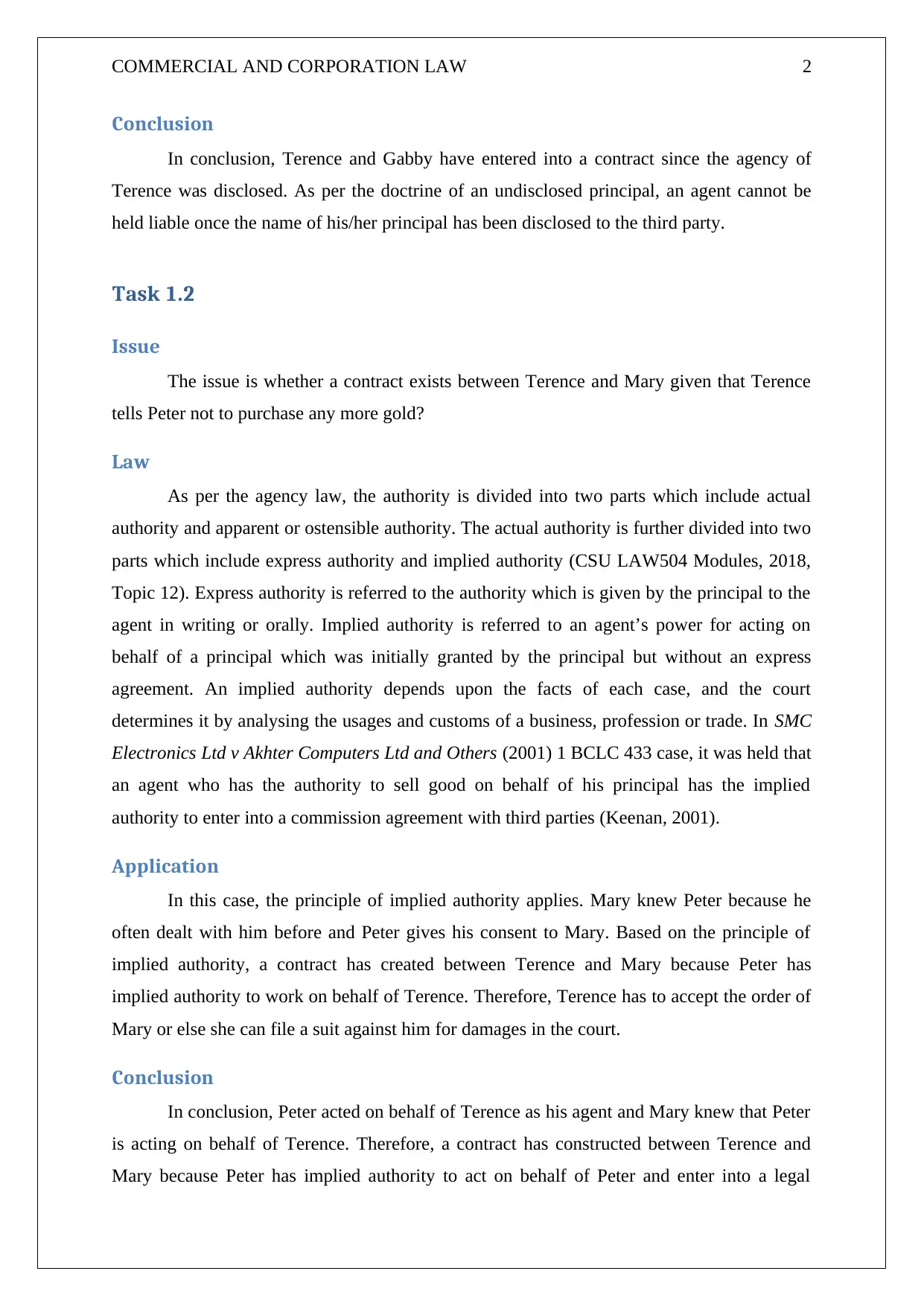
COMMERCIAL AND CORPORATION LAW 2
Conclusion
In conclusion, Terence and Gabby have entered into a contract since the agency of
Terence was disclosed. As per the doctrine of an undisclosed principal, an agent cannot be
held liable once the name of his/her principal has been disclosed to the third party.
Task 1.2
Issue
The issue is whether a contract exists between Terence and Mary given that Terence
tells Peter not to purchase any more gold?
Law
As per the agency law, the authority is divided into two parts which include actual
authority and apparent or ostensible authority. The actual authority is further divided into two
parts which include express authority and implied authority (CSU LAW504 Modules, 2018,
Topic 12). Express authority is referred to the authority which is given by the principal to the
agent in writing or orally. Implied authority is referred to an agent’s power for acting on
behalf of a principal which was initially granted by the principal but without an express
agreement. An implied authority depends upon the facts of each case, and the court
determines it by analysing the usages and customs of a business, profession or trade. In SMC
Electronics Ltd v Akhter Computers Ltd and Others (2001) 1 BCLC 433 case, it was held that
an agent who has the authority to sell good on behalf of his principal has the implied
authority to enter into a commission agreement with third parties (Keenan, 2001).
Application
In this case, the principle of implied authority applies. Mary knew Peter because he
often dealt with him before and Peter gives his consent to Mary. Based on the principle of
implied authority, a contract has created between Terence and Mary because Peter has
implied authority to work on behalf of Terence. Therefore, Terence has to accept the order of
Mary or else she can file a suit against him for damages in the court.
Conclusion
In conclusion, Peter acted on behalf of Terence as his agent and Mary knew that Peter
is acting on behalf of Terence. Therefore, a contract has constructed between Terence and
Mary because Peter has implied authority to act on behalf of Peter and enter into a legal
Conclusion
In conclusion, Terence and Gabby have entered into a contract since the agency of
Terence was disclosed. As per the doctrine of an undisclosed principal, an agent cannot be
held liable once the name of his/her principal has been disclosed to the third party.
Task 1.2
Issue
The issue is whether a contract exists between Terence and Mary given that Terence
tells Peter not to purchase any more gold?
Law
As per the agency law, the authority is divided into two parts which include actual
authority and apparent or ostensible authority. The actual authority is further divided into two
parts which include express authority and implied authority (CSU LAW504 Modules, 2018,
Topic 12). Express authority is referred to the authority which is given by the principal to the
agent in writing or orally. Implied authority is referred to an agent’s power for acting on
behalf of a principal which was initially granted by the principal but without an express
agreement. An implied authority depends upon the facts of each case, and the court
determines it by analysing the usages and customs of a business, profession or trade. In SMC
Electronics Ltd v Akhter Computers Ltd and Others (2001) 1 BCLC 433 case, it was held that
an agent who has the authority to sell good on behalf of his principal has the implied
authority to enter into a commission agreement with third parties (Keenan, 2001).
Application
In this case, the principle of implied authority applies. Mary knew Peter because he
often dealt with him before and Peter gives his consent to Mary. Based on the principle of
implied authority, a contract has created between Terence and Mary because Peter has
implied authority to work on behalf of Terence. Therefore, Terence has to accept the order of
Mary or else she can file a suit against him for damages in the court.
Conclusion
In conclusion, Peter acted on behalf of Terence as his agent and Mary knew that Peter
is acting on behalf of Terence. Therefore, a contract has constructed between Terence and
Mary because Peter has implied authority to act on behalf of Peter and enter into a legal
⊘ This is a preview!⊘
Do you want full access?
Subscribe today to unlock all pages.

Trusted by 1+ million students worldwide
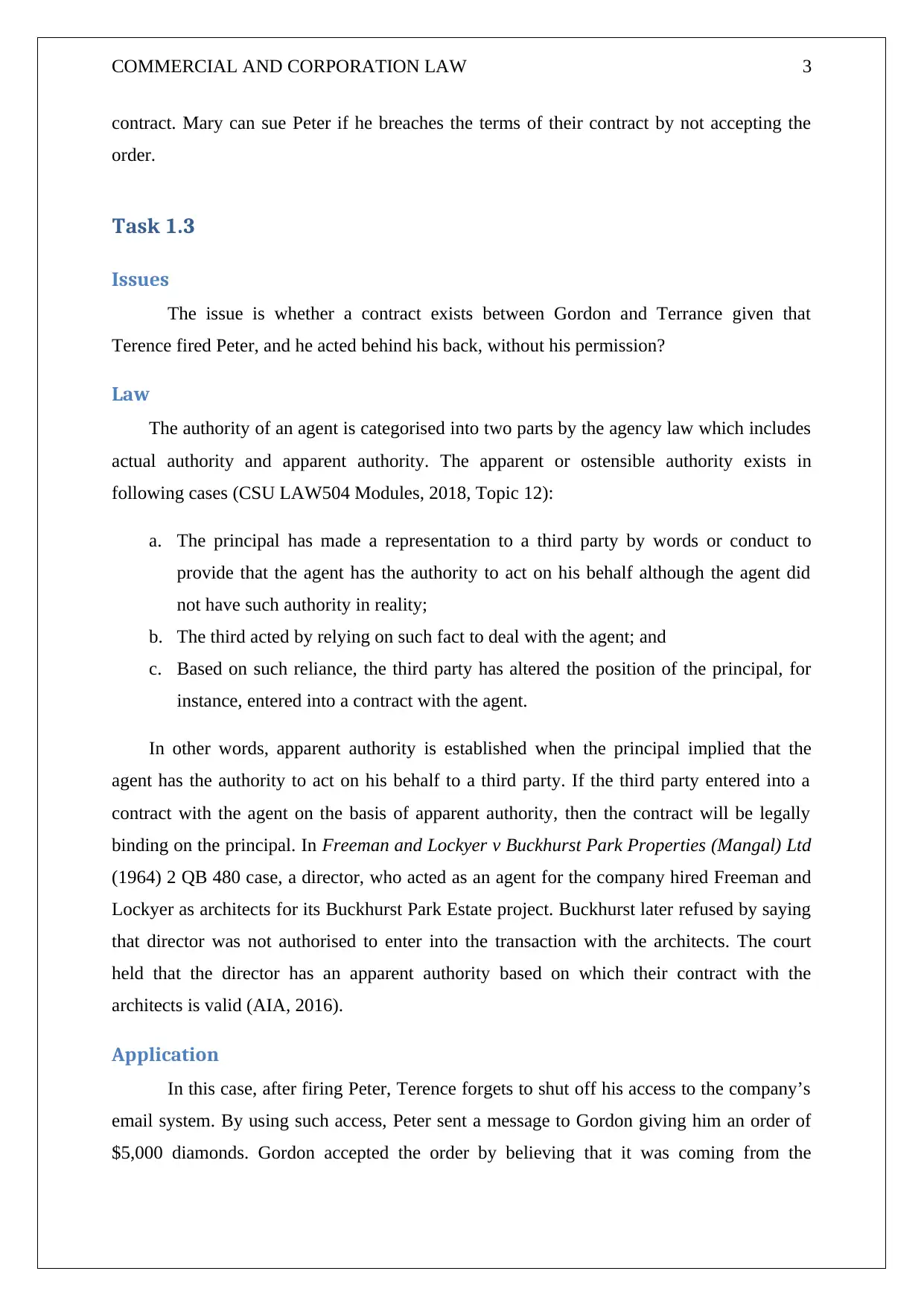
COMMERCIAL AND CORPORATION LAW 3
contract. Mary can sue Peter if he breaches the terms of their contract by not accepting the
order.
Task 1.3
Issues
The issue is whether a contract exists between Gordon and Terrance given that
Terence fired Peter, and he acted behind his back, without his permission?
Law
The authority of an agent is categorised into two parts by the agency law which includes
actual authority and apparent authority. The apparent or ostensible authority exists in
following cases (CSU LAW504 Modules, 2018, Topic 12):
a. The principal has made a representation to a third party by words or conduct to
provide that the agent has the authority to act on his behalf although the agent did
not have such authority in reality;
b. The third acted by relying on such fact to deal with the agent; and
c. Based on such reliance, the third party has altered the position of the principal, for
instance, entered into a contract with the agent.
In other words, apparent authority is established when the principal implied that the
agent has the authority to act on his behalf to a third party. If the third party entered into a
contract with the agent on the basis of apparent authority, then the contract will be legally
binding on the principal. In Freeman and Lockyer v Buckhurst Park Properties (Mangal) Ltd
(1964) 2 QB 480 case, a director, who acted as an agent for the company hired Freeman and
Lockyer as architects for its Buckhurst Park Estate project. Buckhurst later refused by saying
that director was not authorised to enter into the transaction with the architects. The court
held that the director has an apparent authority based on which their contract with the
architects is valid (AIA, 2016).
Application
In this case, after firing Peter, Terence forgets to shut off his access to the company’s
email system. By using such access, Peter sent a message to Gordon giving him an order of
$5,000 diamonds. Gordon accepted the order by believing that it was coming from the
contract. Mary can sue Peter if he breaches the terms of their contract by not accepting the
order.
Task 1.3
Issues
The issue is whether a contract exists between Gordon and Terrance given that
Terence fired Peter, and he acted behind his back, without his permission?
Law
The authority of an agent is categorised into two parts by the agency law which includes
actual authority and apparent authority. The apparent or ostensible authority exists in
following cases (CSU LAW504 Modules, 2018, Topic 12):
a. The principal has made a representation to a third party by words or conduct to
provide that the agent has the authority to act on his behalf although the agent did
not have such authority in reality;
b. The third acted by relying on such fact to deal with the agent; and
c. Based on such reliance, the third party has altered the position of the principal, for
instance, entered into a contract with the agent.
In other words, apparent authority is established when the principal implied that the
agent has the authority to act on his behalf to a third party. If the third party entered into a
contract with the agent on the basis of apparent authority, then the contract will be legally
binding on the principal. In Freeman and Lockyer v Buckhurst Park Properties (Mangal) Ltd
(1964) 2 QB 480 case, a director, who acted as an agent for the company hired Freeman and
Lockyer as architects for its Buckhurst Park Estate project. Buckhurst later refused by saying
that director was not authorised to enter into the transaction with the architects. The court
held that the director has an apparent authority based on which their contract with the
architects is valid (AIA, 2016).
Application
In this case, after firing Peter, Terence forgets to shut off his access to the company’s
email system. By using such access, Peter sent a message to Gordon giving him an order of
$5,000 diamonds. Gordon accepted the order by believing that it was coming from the
Paraphrase This Document
Need a fresh take? Get an instant paraphrase of this document with our AI Paraphraser
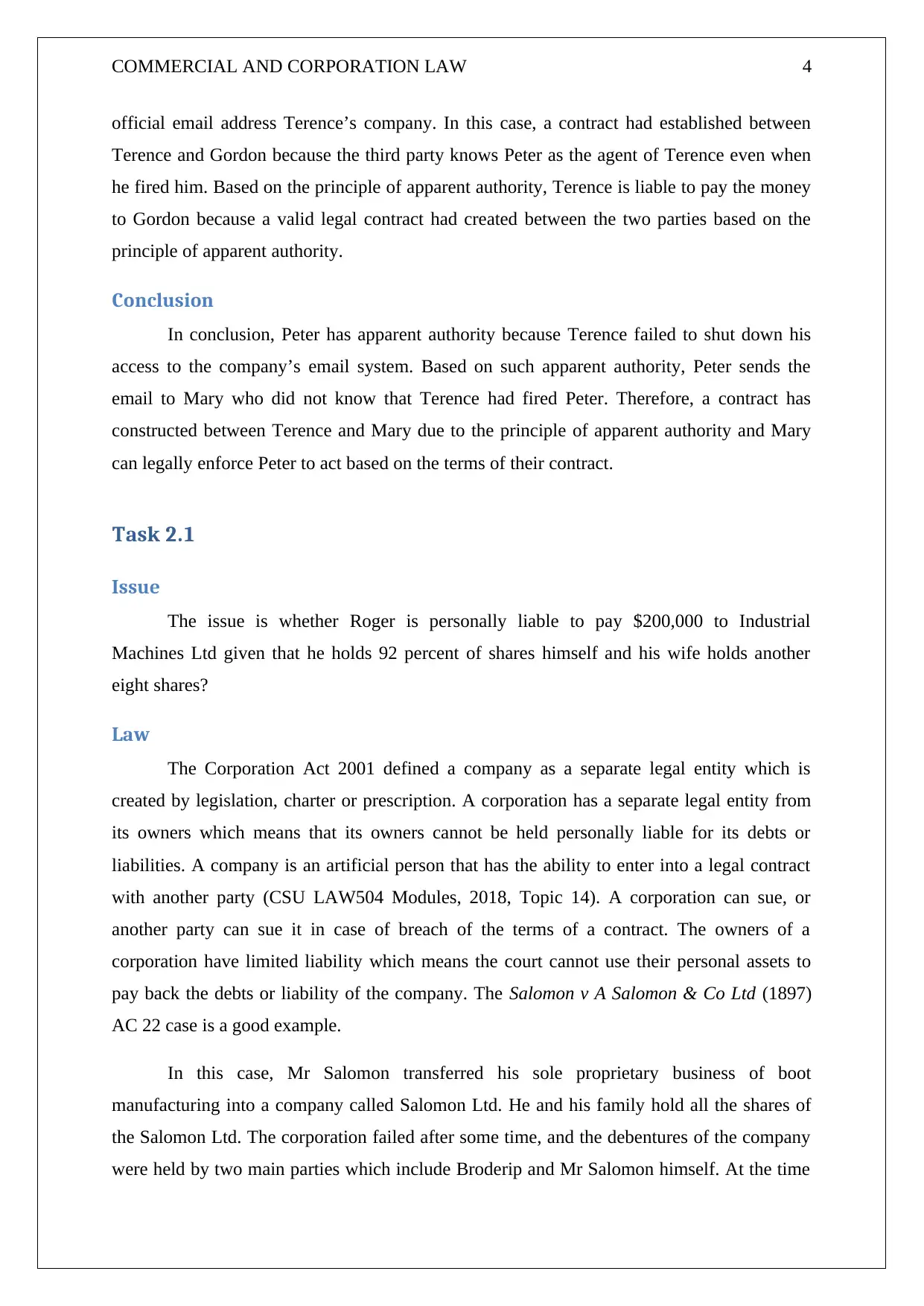
COMMERCIAL AND CORPORATION LAW 4
official email address Terence’s company. In this case, a contract had established between
Terence and Gordon because the third party knows Peter as the agent of Terence even when
he fired him. Based on the principle of apparent authority, Terence is liable to pay the money
to Gordon because a valid legal contract had created between the two parties based on the
principle of apparent authority.
Conclusion
In conclusion, Peter has apparent authority because Terence failed to shut down his
access to the company’s email system. Based on such apparent authority, Peter sends the
email to Mary who did not know that Terence had fired Peter. Therefore, a contract has
constructed between Terence and Mary due to the principle of apparent authority and Mary
can legally enforce Peter to act based on the terms of their contract.
Task 2.1
Issue
The issue is whether Roger is personally liable to pay $200,000 to Industrial
Machines Ltd given that he holds 92 percent of shares himself and his wife holds another
eight shares?
Law
The Corporation Act 2001 defined a company as a separate legal entity which is
created by legislation, charter or prescription. A corporation has a separate legal entity from
its owners which means that its owners cannot be held personally liable for its debts or
liabilities. A company is an artificial person that has the ability to enter into a legal contract
with another party (CSU LAW504 Modules, 2018, Topic 14). A corporation can sue, or
another party can sue it in case of breach of the terms of a contract. The owners of a
corporation have limited liability which means the court cannot use their personal assets to
pay back the debts or liability of the company. The Salomon v A Salomon & Co Ltd (1897)
AC 22 case is a good example.
In this case, Mr Salomon transferred his sole proprietary business of boot
manufacturing into a company called Salomon Ltd. He and his family hold all the shares of
the Salomon Ltd. The corporation failed after some time, and the debentures of the company
were held by two main parties which include Broderip and Mr Salomon himself. At the time
official email address Terence’s company. In this case, a contract had established between
Terence and Gordon because the third party knows Peter as the agent of Terence even when
he fired him. Based on the principle of apparent authority, Terence is liable to pay the money
to Gordon because a valid legal contract had created between the two parties based on the
principle of apparent authority.
Conclusion
In conclusion, Peter has apparent authority because Terence failed to shut down his
access to the company’s email system. Based on such apparent authority, Peter sends the
email to Mary who did not know that Terence had fired Peter. Therefore, a contract has
constructed between Terence and Mary due to the principle of apparent authority and Mary
can legally enforce Peter to act based on the terms of their contract.
Task 2.1
Issue
The issue is whether Roger is personally liable to pay $200,000 to Industrial
Machines Ltd given that he holds 92 percent of shares himself and his wife holds another
eight shares?
Law
The Corporation Act 2001 defined a company as a separate legal entity which is
created by legislation, charter or prescription. A corporation has a separate legal entity from
its owners which means that its owners cannot be held personally liable for its debts or
liabilities. A company is an artificial person that has the ability to enter into a legal contract
with another party (CSU LAW504 Modules, 2018, Topic 14). A corporation can sue, or
another party can sue it in case of breach of the terms of a contract. The owners of a
corporation have limited liability which means the court cannot use their personal assets to
pay back the debts or liability of the company. The Salomon v A Salomon & Co Ltd (1897)
AC 22 case is a good example.
In this case, Mr Salomon transferred his sole proprietary business of boot
manufacturing into a company called Salomon Ltd. He and his family hold all the shares of
the Salomon Ltd. The corporation failed after some time, and the debentures of the company
were held by two main parties which include Broderip and Mr Salomon himself. At the time
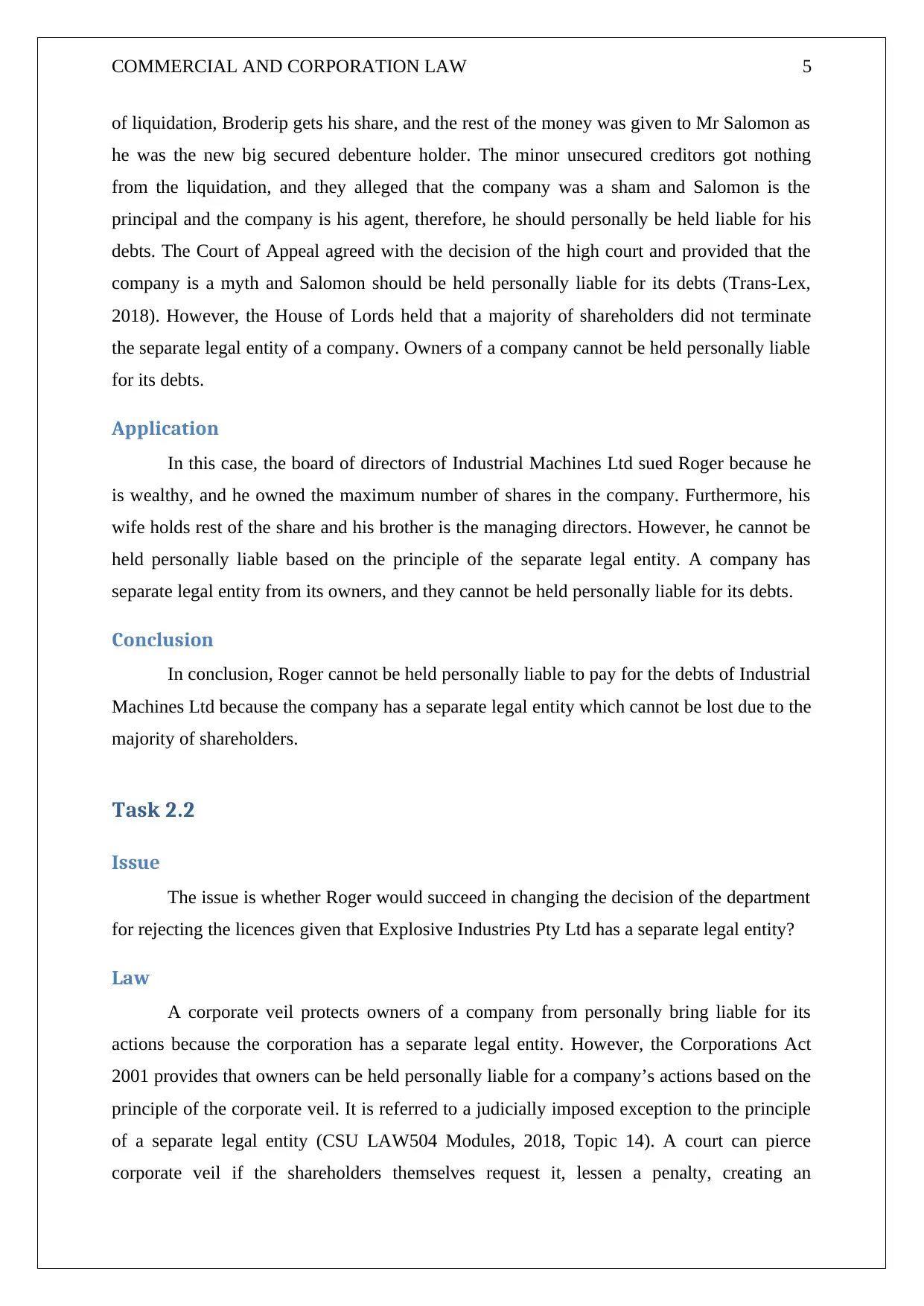
COMMERCIAL AND CORPORATION LAW 5
of liquidation, Broderip gets his share, and the rest of the money was given to Mr Salomon as
he was the new big secured debenture holder. The minor unsecured creditors got nothing
from the liquidation, and they alleged that the company was a sham and Salomon is the
principal and the company is his agent, therefore, he should personally be held liable for his
debts. The Court of Appeal agreed with the decision of the high court and provided that the
company is a myth and Salomon should be held personally liable for its debts (Trans-Lex,
2018). However, the House of Lords held that a majority of shareholders did not terminate
the separate legal entity of a company. Owners of a company cannot be held personally liable
for its debts.
Application
In this case, the board of directors of Industrial Machines Ltd sued Roger because he
is wealthy, and he owned the maximum number of shares in the company. Furthermore, his
wife holds rest of the share and his brother is the managing directors. However, he cannot be
held personally liable based on the principle of the separate legal entity. A company has
separate legal entity from its owners, and they cannot be held personally liable for its debts.
Conclusion
In conclusion, Roger cannot be held personally liable to pay for the debts of Industrial
Machines Ltd because the company has a separate legal entity which cannot be lost due to the
majority of shareholders.
Task 2.2
Issue
The issue is whether Roger would succeed in changing the decision of the department
for rejecting the licences given that Explosive Industries Pty Ltd has a separate legal entity?
Law
A corporate veil protects owners of a company from personally bring liable for its
actions because the corporation has a separate legal entity. However, the Corporations Act
2001 provides that owners can be held personally liable for a company’s actions based on the
principle of the corporate veil. It is referred to a judicially imposed exception to the principle
of a separate legal entity (CSU LAW504 Modules, 2018, Topic 14). A court can pierce
corporate veil if the shareholders themselves request it, lessen a penalty, creating an
of liquidation, Broderip gets his share, and the rest of the money was given to Mr Salomon as
he was the new big secured debenture holder. The minor unsecured creditors got nothing
from the liquidation, and they alleged that the company was a sham and Salomon is the
principal and the company is his agent, therefore, he should personally be held liable for his
debts. The Court of Appeal agreed with the decision of the high court and provided that the
company is a myth and Salomon should be held personally liable for its debts (Trans-Lex,
2018). However, the House of Lords held that a majority of shareholders did not terminate
the separate legal entity of a company. Owners of a company cannot be held personally liable
for its debts.
Application
In this case, the board of directors of Industrial Machines Ltd sued Roger because he
is wealthy, and he owned the maximum number of shares in the company. Furthermore, his
wife holds rest of the share and his brother is the managing directors. However, he cannot be
held personally liable based on the principle of the separate legal entity. A company has
separate legal entity from its owners, and they cannot be held personally liable for its debts.
Conclusion
In conclusion, Roger cannot be held personally liable to pay for the debts of Industrial
Machines Ltd because the company has a separate legal entity which cannot be lost due to the
majority of shareholders.
Task 2.2
Issue
The issue is whether Roger would succeed in changing the decision of the department
for rejecting the licences given that Explosive Industries Pty Ltd has a separate legal entity?
Law
A corporate veil protects owners of a company from personally bring liable for its
actions because the corporation has a separate legal entity. However, the Corporations Act
2001 provides that owners can be held personally liable for a company’s actions based on the
principle of the corporate veil. It is referred to a judicially imposed exception to the principle
of a separate legal entity (CSU LAW504 Modules, 2018, Topic 14). A court can pierce
corporate veil if the shareholders themselves request it, lessen a penalty, creating an
⊘ This is a preview!⊘
Do you want full access?
Subscribe today to unlock all pages.

Trusted by 1+ million students worldwide
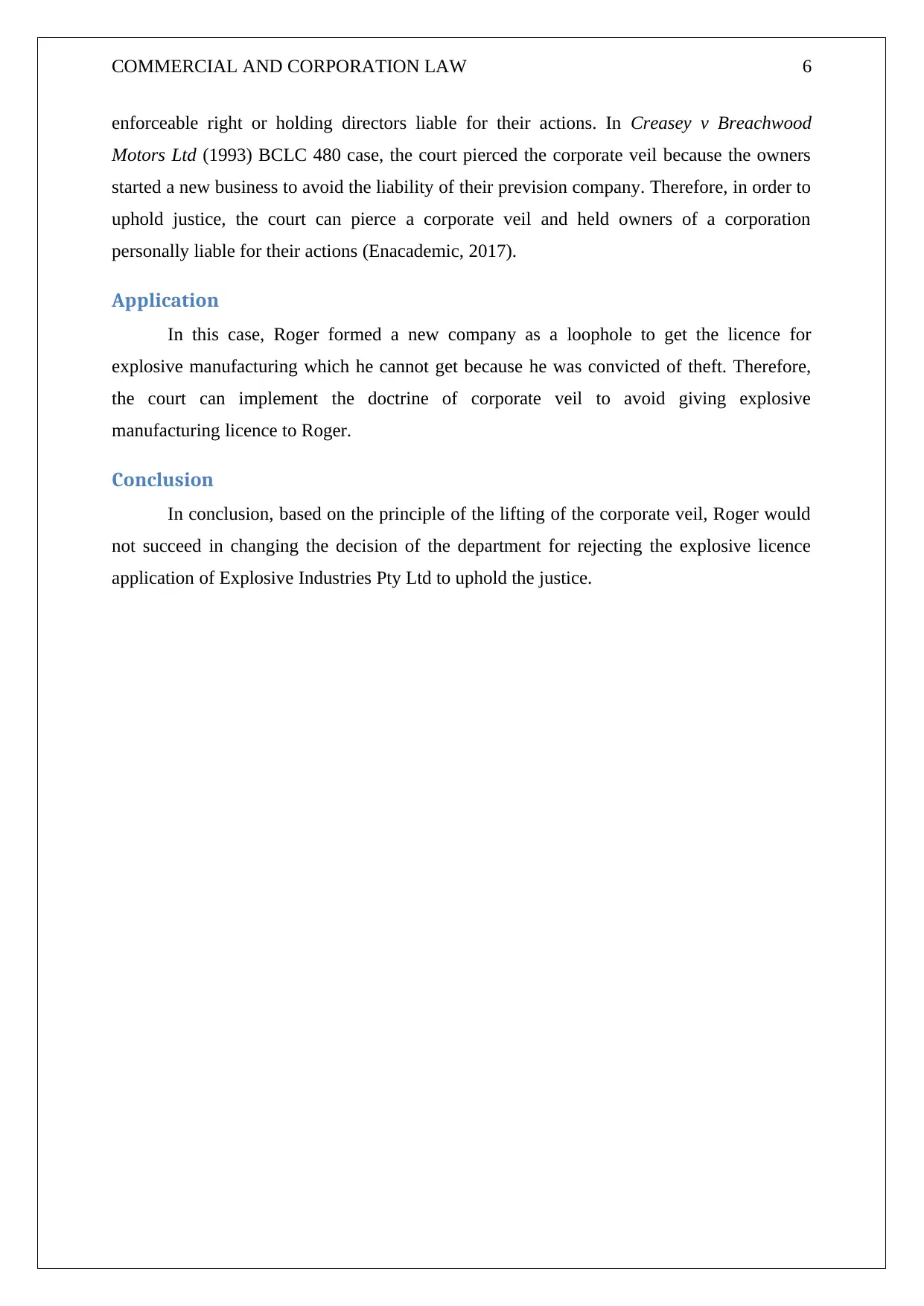
COMMERCIAL AND CORPORATION LAW 6
enforceable right or holding directors liable for their actions. In Creasey v Breachwood
Motors Ltd (1993) BCLC 480 case, the court pierced the corporate veil because the owners
started a new business to avoid the liability of their prevision company. Therefore, in order to
uphold justice, the court can pierce a corporate veil and held owners of a corporation
personally liable for their actions (Enacademic, 2017).
Application
In this case, Roger formed a new company as a loophole to get the licence for
explosive manufacturing which he cannot get because he was convicted of theft. Therefore,
the court can implement the doctrine of corporate veil to avoid giving explosive
manufacturing licence to Roger.
Conclusion
In conclusion, based on the principle of the lifting of the corporate veil, Roger would
not succeed in changing the decision of the department for rejecting the explosive licence
application of Explosive Industries Pty Ltd to uphold the justice.
enforceable right or holding directors liable for their actions. In Creasey v Breachwood
Motors Ltd (1993) BCLC 480 case, the court pierced the corporate veil because the owners
started a new business to avoid the liability of their prevision company. Therefore, in order to
uphold justice, the court can pierce a corporate veil and held owners of a corporation
personally liable for their actions (Enacademic, 2017).
Application
In this case, Roger formed a new company as a loophole to get the licence for
explosive manufacturing which he cannot get because he was convicted of theft. Therefore,
the court can implement the doctrine of corporate veil to avoid giving explosive
manufacturing licence to Roger.
Conclusion
In conclusion, based on the principle of the lifting of the corporate veil, Roger would
not succeed in changing the decision of the department for rejecting the explosive licence
application of Explosive Industries Pty Ltd to uphold the justice.
Paraphrase This Document
Need a fresh take? Get an instant paraphrase of this document with our AI Paraphraser
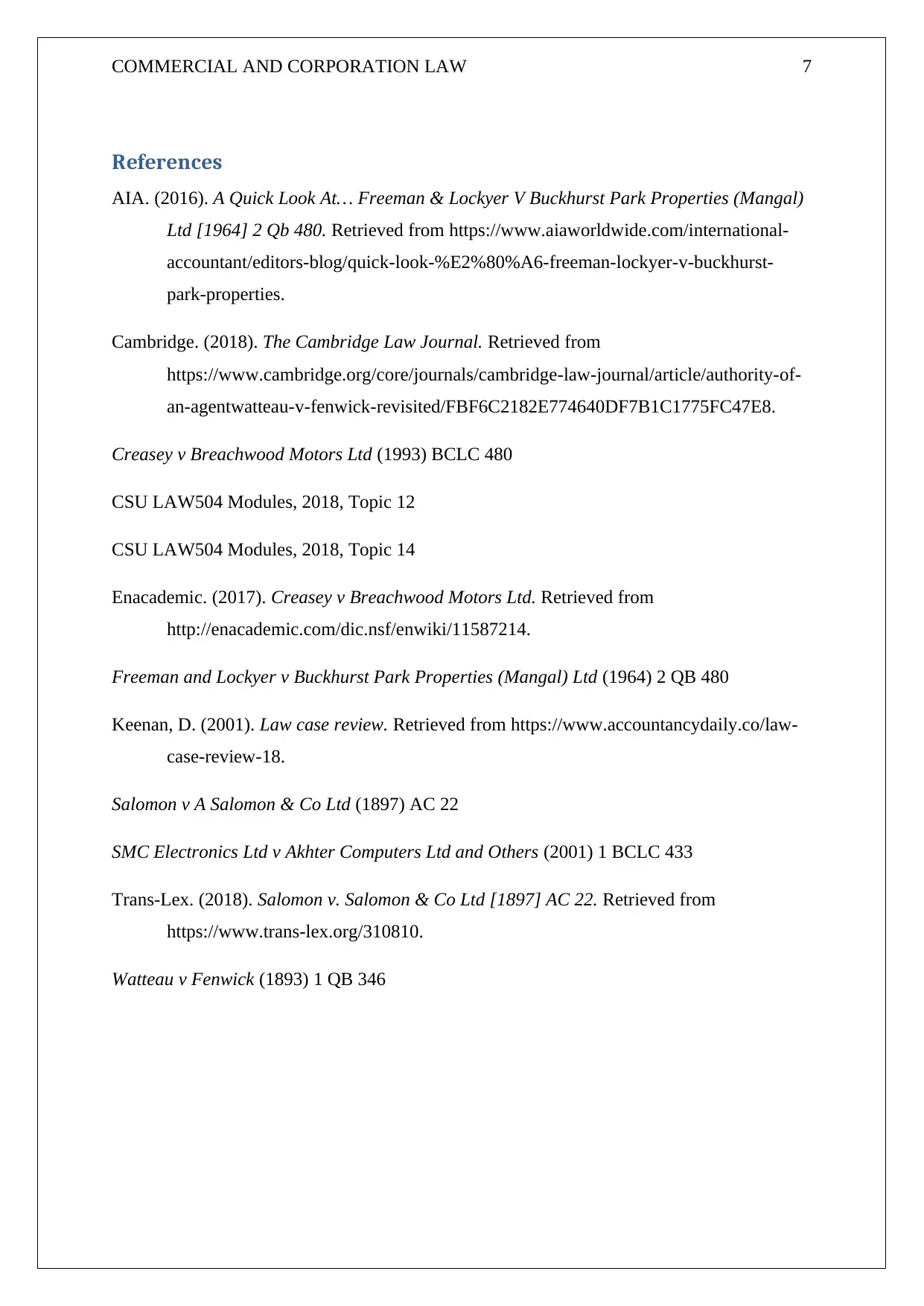
COMMERCIAL AND CORPORATION LAW 7
References
AIA. (2016). A Quick Look At… Freeman & Lockyer V Buckhurst Park Properties (Mangal)
Ltd [1964] 2 Qb 480. Retrieved from https://www.aiaworldwide.com/international-
accountant/editors-blog/quick-look-%E2%80%A6-freeman-lockyer-v-buckhurst-
park-properties.
Cambridge. (2018). The Cambridge Law Journal. Retrieved from
https://www.cambridge.org/core/journals/cambridge-law-journal/article/authority-of-
an-agentwatteau-v-fenwick-revisited/FBF6C2182E774640DF7B1C1775FC47E8.
Creasey v Breachwood Motors Ltd (1993) BCLC 480
CSU LAW504 Modules, 2018, Topic 12
CSU LAW504 Modules, 2018, Topic 14
Enacademic. (2017). Creasey v Breachwood Motors Ltd. Retrieved from
http://enacademic.com/dic.nsf/enwiki/11587214.
Freeman and Lockyer v Buckhurst Park Properties (Mangal) Ltd (1964) 2 QB 480
Keenan, D. (2001). Law case review. Retrieved from https://www.accountancydaily.co/law-
case-review-18.
Salomon v A Salomon & Co Ltd (1897) AC 22
SMC Electronics Ltd v Akhter Computers Ltd and Others (2001) 1 BCLC 433
Trans-Lex. (2018). Salomon v. Salomon & Co Ltd [1897] AC 22. Retrieved from
https://www.trans-lex.org/310810.
Watteau v Fenwick (1893) 1 QB 346
References
AIA. (2016). A Quick Look At… Freeman & Lockyer V Buckhurst Park Properties (Mangal)
Ltd [1964] 2 Qb 480. Retrieved from https://www.aiaworldwide.com/international-
accountant/editors-blog/quick-look-%E2%80%A6-freeman-lockyer-v-buckhurst-
park-properties.
Cambridge. (2018). The Cambridge Law Journal. Retrieved from
https://www.cambridge.org/core/journals/cambridge-law-journal/article/authority-of-
an-agentwatteau-v-fenwick-revisited/FBF6C2182E774640DF7B1C1775FC47E8.
Creasey v Breachwood Motors Ltd (1993) BCLC 480
CSU LAW504 Modules, 2018, Topic 12
CSU LAW504 Modules, 2018, Topic 14
Enacademic. (2017). Creasey v Breachwood Motors Ltd. Retrieved from
http://enacademic.com/dic.nsf/enwiki/11587214.
Freeman and Lockyer v Buckhurst Park Properties (Mangal) Ltd (1964) 2 QB 480
Keenan, D. (2001). Law case review. Retrieved from https://www.accountancydaily.co/law-
case-review-18.
Salomon v A Salomon & Co Ltd (1897) AC 22
SMC Electronics Ltd v Akhter Computers Ltd and Others (2001) 1 BCLC 433
Trans-Lex. (2018). Salomon v. Salomon & Co Ltd [1897] AC 22. Retrieved from
https://www.trans-lex.org/310810.
Watteau v Fenwick (1893) 1 QB 346
1 out of 8
Related Documents
Your All-in-One AI-Powered Toolkit for Academic Success.
+13062052269
info@desklib.com
Available 24*7 on WhatsApp / Email
![[object Object]](/_next/static/media/star-bottom.7253800d.svg)
Unlock your academic potential
Copyright © 2020–2026 A2Z Services. All Rights Reserved. Developed and managed by ZUCOL.



